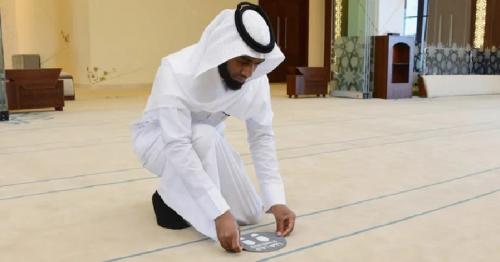The Introduction of the Prophet's Mosque in Madinah
That building and making the most of mosques as a matter of great urgency to the Prophet (pbuh) has been highlighted once again prior to the Prophet's arrival into the city of Madinah proper. It was Friday when the Prophet (pbuh) set off from Quba' to Madinah. On the way, before he arrived, the time for the Jumu'ah Prayer drew near.
Being used to offering prayers wherever their appointed times overtook him, even if he happened to be in a sheepfold, the Prophet (pbuh) performed the Jumu'ah Prayer with the tribe of Banu Salim b. 'Uwq because he happened to pass right through their quarter at the time of the prayer. They prayed most probably at a plain that functioned as a makeshift mosque of the Banu Salim b. 'Uwq tribe. That was the Prophet's first Jumu'ah Prayer in Madinah. The number of worshippers was about one hundred; some estimated that it was about forty.

When Prophet Muhammad (pbuh) arrived in Madinah from Makkah - an exploit called hijrah or migration -- the first and immediate task relating to the built environment, as well as to the community building process, that he embarked on fulfilling was building the city's central mosque, also called the Prophet's mosque. Every other undertaking, including building houses for the migrants (muhajirs) who were practically homeless, had to be put off till after the Prophet's mosque was completed. Herein, too, lies a clue as to the extreme importance of the mosque and the profundity of its message in Islam.
When the migrants arrived in Madinah, almost all of them were very destitute and virtually homeless. At the same time, the aspiring community had no mosques or any other social institutions. While the first problem the Prophet (pbuh) was able to successfully manipulate and circumnavigate without really abandoning it and so causing any serious harm to the society, the latter predicament, however, could neither be disregarded, even for a short time, nor substituted with another feasible alternatives. Hence, the instituting of a principal mosque in Madinah needed immediate attention. For the housing of the migrants, a workable alternative had to be found.

If the migrants had no houses of their own, there were many other houses in Madinah which if shared were able to offer temporary relief. If truth be told, the migrants needed homes, rather than just houses. The Prophet (pbuh) sought to offer them the former. The latter, he knew, would come in due course. The migrants might have hastened immediately to acquire houses for themselves. But such would have been at the expense of acquiring homes, because they were in a foreign country in Madinah, having been forced to abandon their homes, properties, family roots and quite a number of closest family members in Makkah. Thus, providing homes, and not houses, was a priority for the migrants. That exactly was the thing which the Prophet (pbuh) had in mind and the natives of Madinah (the helpers or ansar) were excited about providing as a solution till the migrants got their own houses and homes. Hence, the helpers offered their houses to be shared with their brethren from Makkah. Although it was transitory in nature, the helpers' offering the migrants a genuine home went a long way towards the realization of the Prophet's and Islam's mission in Madinah.
...[ Continue to next page ] / Source: islamicity






Comments